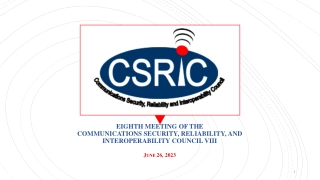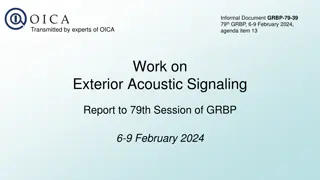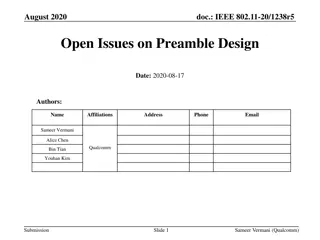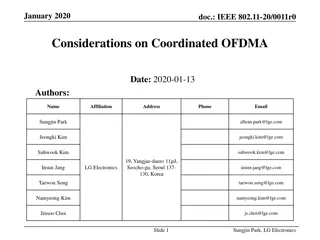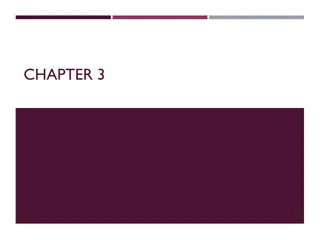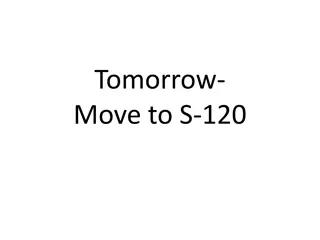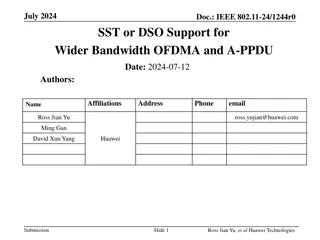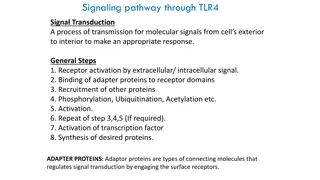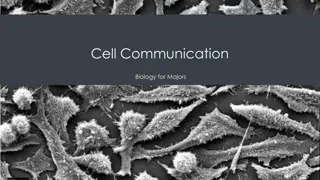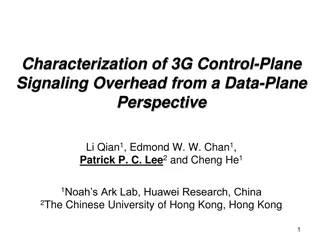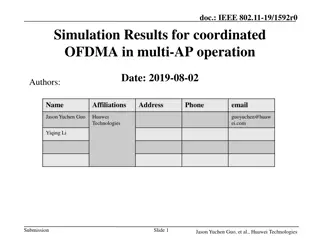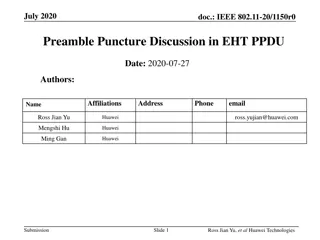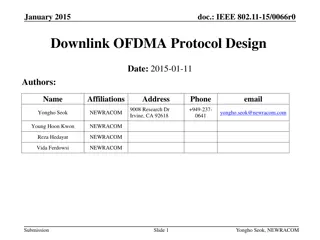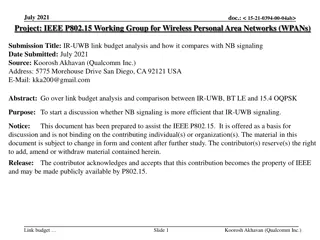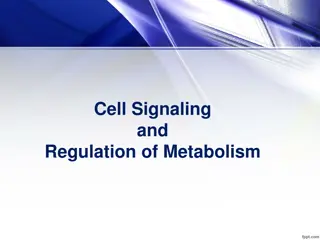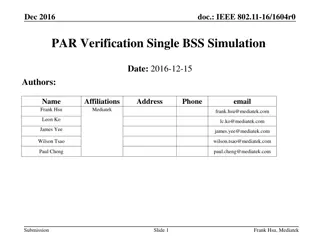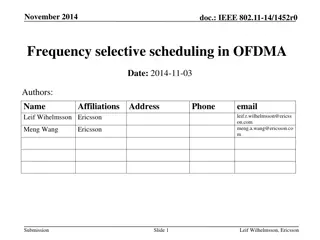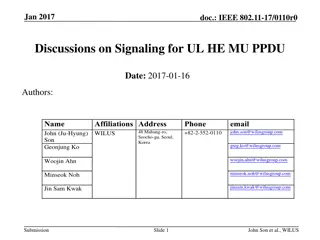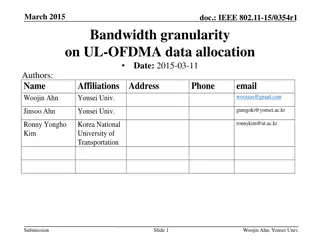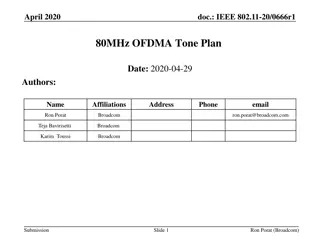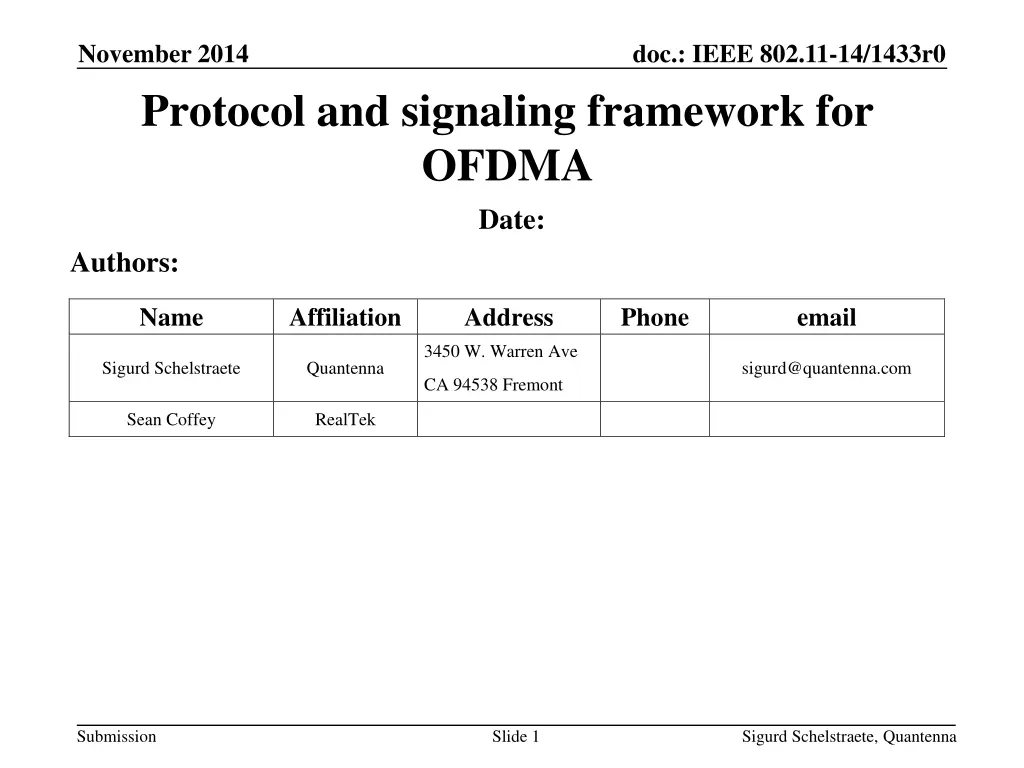
Framework for OFDMA Protocol and Signaling in High-Density Networks
Explore the protocol and signaling framework for OFDMA technology in high-density networks, discussing user grouping, transmission parameters, and the adaptation of MU-MIMO concepts for enhanced performance.
Uploaded on | 0 Views
Download Presentation

Please find below an Image/Link to download the presentation.
The content on the website is provided AS IS for your information and personal use only. It may not be sold, licensed, or shared on other websites without obtaining consent from the author. If you encounter any issues during the download, it is possible that the publisher has removed the file from their server.
You are allowed to download the files provided on this website for personal or commercial use, subject to the condition that they are used lawfully. All files are the property of their respective owners.
The content on the website is provided AS IS for your information and personal use only. It may not be sold, licensed, or shared on other websites without obtaining consent from the author.
E N D
Presentation Transcript
November 2014 Protocol and signaling framework for OFDMA Date: Authors: doc.: IEEE 802.11-14/1433r0 Name Affiliation Address Phone email 3450 W. Warren Ave Sigurd Schelstraete Quantenna sigurd@quantenna.com CA 94538 Fremont Sean Coffey RealTek Submission Slide 1 Sigurd Schelstraete, Quantenna
November 2014 doc.: IEEE 802.11-14/1433r0 Introduction OFDMA is a promising candidate technology for increasing throughput in high-density networks Performance has been discussed in [1] More detailed technical proposals in [2-4] Submission Slide 2 Sigurd Schelstraete, Quantenna
November 2014 doc.: IEEE 802.11-14/1433r0 Protocol and signaling framework for OFDMA OFDMA needs a protocol and signaling framework to operate in practice Which users to combine? Transmission parameters per user (#streams, MCS) IEEE 802.11-14/1210 : HEW PPDU Format for Supporting MIMO-OFDMA Flexibility per user (MCS, #streams, coding type) Discussion of preamble design Discussion of ACK mechanism Submission Slide 3 Sigurd Schelstraete, Quantenna
November 2014 doc.: IEEE 802.11-14/1433r0 Observation For practical implementation of OFDMA, many of the necessary concepts already exist in MU-MIMO Grouping and group management Signaling through user position (instead of STA ID, ) Per-user parameter values (MCS, FEC, ) ACK procedures for multiple users We should consider the MU-MIMO protocol and signaling as a basis for OFDMA Proven concepts Facilitate combined MU-MIMO/OFDMA systems Submission Slide 4 Sigurd Schelstraete, Quantenna
November 2014 doc.: IEEE 802.11-14/1433r0 Grouping MU-MIMO groups users in semi-static groups Group ID management frames establish and modify the members of the group and their positions within a group For OFDMA: Define similar OFDMA group concept Define (or re-use) group management frame to select users and to assign users their frequency segment ( user position ) Example re-definition of user position : Submission Slide 5 Sigurd Schelstraete, Quantenna
November 2014 doc.: IEEE 802.11-14/1433r0 Per-user transmission parameters In MU-MIMO: # streams and FEC type are signaled per user in VHT-SIG-A for up to 4 users MCS signaled per user in VHT-SIG-B OFDMA: Almost complete re-use of parameters in VHT-SIG-A and VHT- SIG-B (or equivalent ax fields) No redefinition No additional bits/symbols in preamble VHT-SIG-B will contain different information per (20 MHz) frequency segment Submission Slide 6 Sigurd Schelstraete, Quantenna
November 2014 doc.: IEEE 802.11-14/1433r0 ACK mechanism MU-MIMO one immediate ACK, followed by one or more BAR/ACK exchanges OFDMA Similar mechanism applies More advanced ACK mechanism can be considered, but it is suggested to at least support the current mechanism for OFDMA Submission Slide 7 Sigurd Schelstraete, Quantenna
November 2014 doc.: IEEE 802.11-14/1433r0 Limitations MU-MIMO Up to 4 users, Up to 8 total streams OFDMA Maintain same limitations If the number of users or total number of streams is increased in 11ax, apply to both MU-MIMO and OFDMA Submission Slide 8 Sigurd Schelstraete, Quantenna
November 2014 doc.: IEEE 802.11-14/1433r0 Preamble considerations Legacy preamble (incl. VHT-SIG-A) similar to 11ac VHT-STF and VHT-LTF duplicated across the band VHT-LTF Same number of VHT-LTF symbols for all users If not all users have the same number of streams, insert extra symbols Simple extension of current signal definition Actually improves channel estimation for users with lower # streams VHT-SIG-B Possibly different content per 20 MHz Submission Slide 9 Sigurd Schelstraete, Quantenna
November 2014 doc.: IEEE 802.11-14/1433r0 Receiver consideration Receiver typically processes legacy preamble (incl. VHT-SIG-A) on the primary 20 MHz channel All 20 MHz channels carry the same information Parse VHT-SIG-A GROUP_ID identifies the packet as OFDMA GROUP_ID identifies the 20 MHz band for the receiving STA Max #streams across all users establishes # VHT-LTF symbols After VHT-SIG-A, switch further processing to the appropriate 20 MHz channel Process the remaining frame (incl. VHT-LTF, VHT-SIG-B, data) as a 20 MHz frame NOTE: discussion is given for 20 MHz channels. Extension to other cases is straightforward. Submission Slide 10 Sigurd Schelstraete, Quantenna
November 2014 doc.: IEEE 802.11-14/1433r0 Conclusion The MU-MIMO protocol and signaling framework provides many of the elements that are needed for OFDMA We should consider the existing framework as the basis for OFDMA. Specifically: Grouping/group ID Identify users by group and user position Per-user signaling in preamble fields (similar to 11ac) ACK mechanism using combination of immediate and BAR Submission Slide 11 Sigurd Schelstraete, Quantenna
November 2014 doc.: IEEE 802.11-14/1433r0 References [1] IEEE 802.11-14/1227: OFDMA Performance Analysis [2] IEEE 802.11-14/1208: MAC considerations on 802.11ax OFDMA [3] IEEE 802.11-14/1210: HEW PPDU Format for Supporting MIMO-OFDMA [4] IEEE 802.11-14/0839: Discussion on OFDMA in IEEE 802.11ax Submission Slide 12 Sigurd Schelstraete, Quantenna

